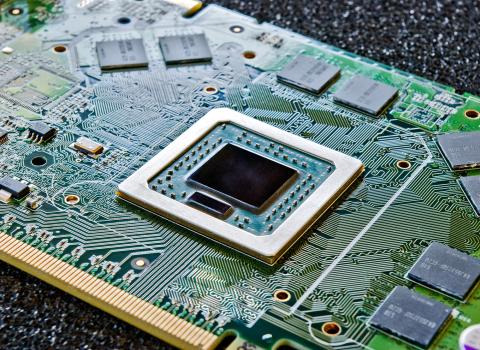US President Donald Trump’s early and wide-ranging moves on climate change include proposals to gut the Environmental Protection Agency, tear up regulations on greenhouse gas emissions and revive the coal industry.
But while climate experts regard these moves as reckless, they do not see them having an impact on the broader march of green innovation or the implementation of the Paris Agreement on global warming.
“This is no time for the world's second largest emitter to be lifting its foot off the accelerator of climate action, much less slamming the brakes,” said Paul Bodnar, energy adviser on Barack Obama’s National Security Council, who was involved in negotiating the Paris Agreement. “But I don't think the change in US domestic policy will destabilise the Paris Agreement itself, nor do I expect a slowdown in action from China or the EU.”
Even given that the world’s biggest economy is now unlikely to meet its commitments under an accord signed up to by nearly 200 countries, that will not slow the march toward cleaner energy technologies, Bodnar believes. The extremely hard-won Paris deal was reached mainly because countries have come to see the low-carbon transition as being in their self-interest.
“Individual parties may occasionally wobble in that conviction for a while, but the fact that the regime is built on self-interest makes it very robust to such episodes,” said Bodnar.
EU officials have said they remain steadfastly committed to the Paris accord, regardless of any new directions taken in the US.
And far from pulling back on its own climate obligations, China now spots an advantage, said Yuan Xu, leader of environmental policy at the Chinese University of Hong Kong. “China will not let this Trump opportunity go,” he said. “It is taking climate change more and more as an opportunity rather than as a burden.”
Trump’s policies would hurt renewable energy industries in the US rather than in other parts of the world, according to Xu. “Trump’s policy could further reduce incentives and demand for developing such industries in the US,” he said.
The US trails China and Europe in creating jobs in renewable energy. In 2015, of the 8.1 million people working in the sector, only 770,000 were in the US.
Path already set
During the election campaign Trump said he would pull the US out of the Paris climate accord – arguing that implementing it would hurt US business – but there is no word as yet on a formal withdrawal.
“There is a disagreement in the administration about the benefits of remaining in [the] Paris [agreement],” said Ben Schreiber, a senior political strategist at the pressure group Friends of the Earth US. “Trump has basically appointed a bunch of climate deniers, and now there is a strategic conversation about how to advance fossil [fuel] industries under the Paris Agreement, rather than use it to diminish global warming,” he said.

Source: World Resources Institute, 2012
Even given the currently frayed US-EU relationship, pressure from European officials can help ensure US cooperation on climate change in the long run. “Long-term, political and economic pressure from Europe can have an effect. Becoming an international pariah is not a status most Americans want to have,” Schreiber said. “Remember, Trump is incredibly unpopular here. The majority of people don’t want to see his extreme agenda.”
The complex and lengthy legal process of unwinding Obama-era climate legislation means the overall damage will be small said Richard Tol, professor of the economics of climate change at Sussex University. “These things work their way through regulations only slowly, and then the regulations work their way through to energy use even more slowly,” he said. “Everything depends on how long Trump will stay in power…If the market expects Trump to be gone soon, his impact on innovation will be small.”
The US had set course towards a lower-carbon economy before Trump came to office. “So his actions won’t be enough to kill transition. But the real question is whether the transition is going fast enough anyway? Even the Paris Agreement is not going to get the world down to a safe level of warming,” Tol said.
Jørgen Eivind Olesen, climate change professor at Aarhus University in Denmark agreed Trump will not derail the Paris accord, but he said, “The ambitions of the Paris Agreement – to keep the planet from warming more than 3.6 degrees – were already unrealistic, and the actions by Trump just emphasised this.”

Source: Global Wind Energy Council, SolarPower Europe
Emboldening opponents of climate action
Trump’s moves on climate policy are having an effect in Russia, said Alexey Kokorin, the head of the climate and energy programme at the World Wide Fund for Nature in Russia. “It means anyone here who already had doubt about climate change – and that’s most people – now have even more doubt.
However, the practical impact is limited. “Russia is not investing seriously in renewable technologies. The Paris Agreement is a PR exercise here, no doubt,” Kokorin said.
Trump has reversed a ban on coal leasing on federal lands but a hoped-for revival of this energy source is unlikely, given the huge rise in US production of natural gas from shale.

Source: US Energy Information Administration
Shares in US coal companies have edged higher under Trump, however shale gas is not only cleaner but more importantly, cheaper than coal, Tol noted. “Regardless of what Trump is doing, as long as the market force is still there, coal will not be able to come back in a significant manner,” he said.





 A unique international forum for public research organisations and companies to connect their external engagement with strategic interests around their R&D system.
A unique international forum for public research organisations and companies to connect their external engagement with strategic interests around their R&D system.